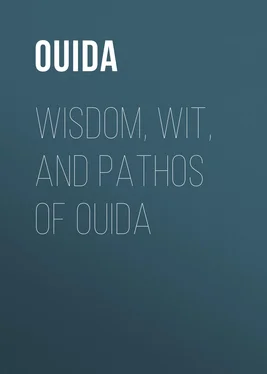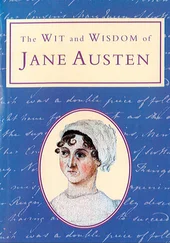Ouida - Wisdom, Wit, and Pathos of Ouida
Здесь есть возможность читать онлайн «Ouida - Wisdom, Wit, and Pathos of Ouida» — ознакомительный отрывок электронной книги совершенно бесплатно, а после прочтения отрывка купить полную версию. В некоторых случаях можно слушать аудио, скачать через торрент в формате fb2 и присутствует краткое содержание. Жанр: foreign_prose, literature_19, foreign_antique, на английском языке. Описание произведения, (предисловие) а так же отзывы посетителей доступны на портале библиотеки ЛибКат.
- Название:Wisdom, Wit, and Pathos of Ouida
- Автор:
- Жанр:
- Год:неизвестен
- ISBN:нет данных
- Рейтинг книги:4 / 5. Голосов: 1
-
Избранное:Добавить в избранное
- Отзывы:
-
Ваша оценка:
- 80
- 1
- 2
- 3
- 4
- 5
Wisdom, Wit, and Pathos of Ouida: краткое содержание, описание и аннотация
Предлагаем к чтению аннотацию, описание, краткое содержание или предисловие (зависит от того, что написал сам автор книги «Wisdom, Wit, and Pathos of Ouida»). Если вы не нашли необходимую информацию о книге — напишите в комментариях, мы постараемся отыскать её.
Wisdom, Wit, and Pathos of Ouida — читать онлайн ознакомительный отрывок
Ниже представлен текст книги, разбитый по страницам. Система сохранения места последней прочитанной страницы, позволяет с удобством читать онлайн бесплатно книгу «Wisdom, Wit, and Pathos of Ouida», без необходимости каждый раз заново искать на чём Вы остановились. Поставьте закладку, и сможете в любой момент перейти на страницу, на которой закончили чтение.
Интервал:
Закладка:
A dim glow from the west, which was still tinged with the fire of the sunset, fell through a great square window set in a stone building, and striking across the sicklier rays of an oil lamp reached the opposing wall within.
It was a wall of grey stone, dead and lustreless like the wall of a prison-house, over whose surface a spider as colourless as itself dragged slowly its crooked hairy limbs loaded with the moisture of the place, which was an old tower, of which the country folk told strange tales, where it stood among the rushes on the left bank of the stream.
A man watched the spider as it went.
It crept on its heavy way across the faint crimson reflection from the glow of the sunken sun.
It was fat, well-nourished, lazy, content; its home of dusky silver hung on high, where its pleasure lay in weaving, clinging, hoarding, breeding. It lived in the dark; it had neither pity nor regret; it troubled itself neither for the death it dealt to nourish itself, nor for the light without, into which it never wandered; it spun and throve and multiplied.
It was an emblem of the man who is wise in his generation; of the man whom Cato the elder deemed divine; of the Majority and the Mediocrity who rule over the earth and enjoy its fruits.
This man knew that it was wise; that those who were like to it were wise also: wise with the holy wisdom which is honoured of other men.
He had been unwise—always; and therefore he stood watching the sun die, with hunger in his soul, with famine in his body.
For many months he had been half famished, as were the wolves in his own northern mountains in the winter solstice. For seven days he had only been able to crush a crust of hard black bread between his teeth. For twenty hours he had not done even so much as this. The trencher on his tressel was empty; and he had not wherewithal to re-fill it.
He might have found some to fill it for him no doubt. He lived amidst the poor, and the poor to the poor are good, though they are bad and bitter to the rich. But he did not open either his lips or his hand. He consumed his heart in silence; and his vitals preyed in anguish on themselves without his yielding to their torments.
He was a madman; and Cato, who measured the godliness of man by what they gained, would have held him accursed;—the madness that starves and is silent for an idea is an insanity, scouted by the world and the gods. For it is an insanity unfruitful; except to the future. And for the future who cares,—save these madmen themselves?
He watched the spider as it went.
It could not speak to him as its fellow once spoke in the old Scottish story. To hear as that captive heard, the hearer must have hope, and a kingdom,—if only in dreams.
This man had no hope; he had a kingdom indeed, but it was not of earth; and, in an hour of sheer cruel bodily pain, earth alone has dominion and power and worth.
The spider crawled across the grey wall; across the glow from the vanished sun; across a coil of a dead passion-vine, that strayed loose through the floor; across the classic shapes of a great cartoon drawn in chalks upon the dull rugged surface of stone.
Nothing arrested it; nothing retarded it, as nothing hastened it. It moved slowly on; fat, lustreless, indolent, hueless; reached at length its den, and there squatted aloft, loving the darkness; its young swarming around, its prey held in its forceps, its nets cast about.
Through the open casement there came on the rising wind of the storm, in the light of the last lingering sunbeam, a beautiful night-moth, begotten by some cruel hot-house heat in the bosom of some frail exiled tropical flower.
It swam in on trembling pinions, and alighted on the golden head of a gathered crocus that lay dying on the stones—a moth that should have been born to no world save that of the summer world of a Midsummer Night's Dream.
A shape of Ariel and Oberon; slender, silver, purple, roseate, lustrous-eyed, and gossamer-winged.
A creature of woodland waters, and blossoming forests; of the yellow chalices of kingcups and the white breasts of river lilies, of moonbeams that strayed through a summer world of shadows, and dew-drops that glistened in the deep folded hearts of roses. A creature to brush the dreaming eyes of a poet, to nestle on the bosom of a young girl sleeping: to float earthwards on a falling star, to slumber on a lotus leaf.
A creature that amidst the still soft hush of woods and waters still tells, to those who listen, of the world when the world was young.
The moth flew on, and poised on the fading crocus leaves, which spread out their pale gold on the level of the grey floor.
It was weary, and its delicate wings drooped; it was storm-tossed, wind-beaten, drenched with mist and frozen with the cold; it belonged to the moon, to the dew, to the lilies, to the forget-me-nots, and to the night; and it found that the hard grip of winter had seized it whilst yet it had thought that the stars and the summer were with it. It lived before its time,—and it was like the human soul, which being born in the darkness of the world dares to dream of light, and, wandering in vain search of a sun that will never rise, falls and perishes in wretchedness.
It was beautiful exceedingly, with the brilliant tropical beauty of a life that is short-lived. It rested a moment on the stem of the pale flower, then with its radiant eyes fastened on the point of light which the lamp thrust upward, it flew on high; and, spreading out its transparent wings and floating to the flame, kissed it, quivered once, and died.
There fell among the dust and cinder of the lamp a little heap of shrunken, fire-scorched, blackened ashes.
The wind whirled them upward from their rest, and drove them forth into the night to mingle with the storm-scourged grasses, the pale dead violets, the withered snow-flowers, with all things frost-touched and forgotten.
The spider sat aloft, sucking the juices from the fettered flies, teaching its spawn to prey and feed; content in squalor and in plenitude; in sensual sloth, and in the increase of its body and its hoard.
He watched them both: the success of the spider, the death of the moth; trite as a fable; ever repeated as the tides of the sea; the two symbols of humanity; of the life which fattens on greed and gain, and the life which perishes of divine desire.
There were no rare birds, no birds of moor and mountain, in that cultivated and populous district; but to her all the little home-bred things of pasture and orchard were full of poetry and of character.
The robins, with that pretty air of boldness with which they veil their real shyness and timidity; the strong and saucy sparrows, powerful by the strength of all mediocrities and majorities; all the dainty families of finches in their gay apparellings; the plain brown bird that filled the night with music; the gorgeous oriole ruffling in gold, the gilded princeling of them all; the little blue warblers, the violets of the air; the kingfishers who had hovered so long over the forget-me-nots upon the rivers that they had caught the colours of the flowers on their wings; the bright blackcaps green as the leaves, with their yellow waistcoats and velvet hoods, the innocent freebooters of the woodland liberties: all these were her friends and lovers, various as any human crowds of court or city.
She loved them; they and the fourfooted beasts were the sole things that did not flee from her; and the woeful and mad slaughter of them by the peasants was to her a grief passionate in its despair. She did not reason on what she felt; but to her a bird slain was a trust betrayed, an innocence defiled, a creature of heaven struck to earth.
Suddenly on the silence of the garden there was a little shrill sound of pain; the birds flew high in air, screaming and startled; the leaves of a bough of ivy shook as with a struggle.
Читать дальшеИнтервал:
Закладка:
Похожие книги на «Wisdom, Wit, and Pathos of Ouida»
Представляем Вашему вниманию похожие книги на «Wisdom, Wit, and Pathos of Ouida» списком для выбора. Мы отобрали схожую по названию и смыслу литературу в надежде предоставить читателям больше вариантов отыскать новые, интересные, ещё непрочитанные произведения.
Обсуждение, отзывы о книге «Wisdom, Wit, and Pathos of Ouida» и просто собственные мнения читателей. Оставьте ваши комментарии, напишите, что Вы думаете о произведении, его смысле или главных героях. Укажите что конкретно понравилось, а что нет, и почему Вы так считаете.












